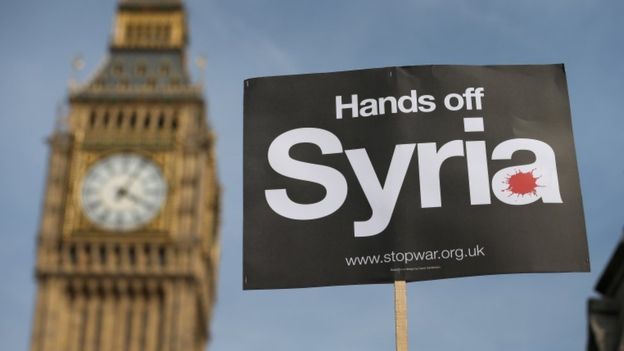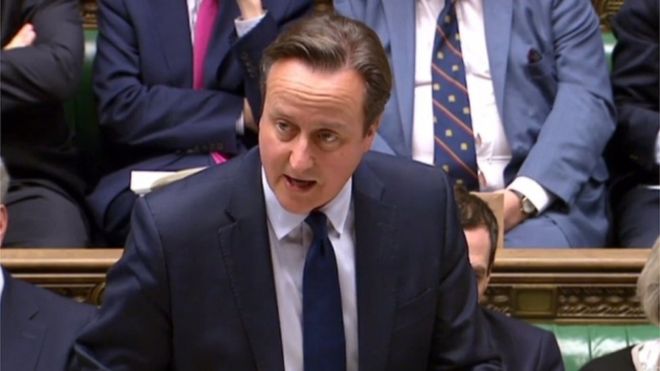The law does not require David Cameron to win a Commons vote before launching military action against Islamic State (IS) militants in Syria.
Politically, though, the prime minister cannot now proceed without a significant parliamentary majority.
In deploying its armed forces, the government acts under prerogative powers.
These are what remains of the powers that the sovereign enjoyed before the establishment of parliamentary government. They are now exercised by ministers on behalf of the Crown.
Because the UK`s constitution is largely unwritten, nobody is quite sure how far the royal prerogative extends.
But everybody agrees that British service personnel operate under the command of the Queen and that the decision to go to war is one for the prime minister. So there is no need for an act of parliament before troops are deployed.
In any case, legislation authorising each new military action would be impractical: there are occasions when troops need to be deployed at short notice or in conditions of secrecy.
And if a fresh act of parliament had been required for air strikes against IS in Syria, it would have needed approval from the Lords as well as the Commons.
In recent years, though, a convention has grown up around the use of military action. That convention is still developing. It may even have changed this week.
A constitutional convention is a practice that is consistently followed by those affected by it - even though it is not legally binding.
It continues for as long as it proves useful but it can be ended at any time, merely by not following it.
And a convention of the constitution can be refined or modified when its suits ministers to do so. For that reason, its scope and effect may be difficult to pin down.
The first time a government sought parliamentary approval for military action on a substantive motion was in 2003, when MPs approved operations in Iraq by 412 votes to 149.
The next was in 2011, when MPs approved military action in Libya - shortly after it had begun. Then in August 2013, the Commons was recalled to vote on the principle of taking military action against the Assad regime in Syria, following its use of chemical weapons.

David Cameron was defeated by 285 votes to 272 and he respected the decision of the Commons.
From this point, it was possible to say that the UK`s constitutional convention on the use of armed force required the prime minister to win a Commons vote on a substantive motion.
That view was buttressed in September 2014 by the Commons vote of 524 to 43 in favour of air strikes against IS in Iraq.
But it was still only a convention. It could be ignored by the prime minister if he thought he could win approval for military action from MPs and, ultimately, the electorate.
At the weekend, it was reported that David Cameron was seeking a majority of at least 30 in Wednesday`s vote.
Although the prime minister did not commit himself to a figure, he delayed calling a vote until he could be sure of a substantial majority. So one can now argue that a very narrow vote in favour of military action would not satisfy the current convention.
Why has the prime minister painted himself into this constitutional corner? Why not use his powers regardless of parliament?
The answer may be both political and personal.
On a political level, he is less open to criticism if he can show that he has the support of most MPs. On a personal level, he can share responsibility for the inevitable casualties of war.
Is military action lawful?
All this is entirely separate from the question of whether military action is lawful under international law.
The government says that its action amounts to self-defence, which is recognised by article 51 of the United Nations charter. To be lawful, such force must be necessary and proportionate.
David Cameron told MPs last week that the IS campaign against the UK and its allies had reached the level of an armed attack, allowing force to be used "in self-defence to prevent further atrocities being committed". Self-defence applies not only to defence of the UK but also to defence of its allies.

So the global coalition is acting in the collective self-defence of Iraq against attacks from IS in Syria.
This, said the prime minister, was "further underscored by the unanimous adoption of UN Security Council resolution 2249" which calls on member states to take "all necessary measures… to prevent and suppress terrorist acts" by IS.
But the resolution goes on to say that states must act "in compliance with international law". That is why it was necessary to justify military action as collective self-defence.
The alternative would have been a resolution passed under chapter VII of the UN charter, under which the Security Council may authorise military operations by member states.
But that was clearly a step too far. Instead, we have a resolution that provides political cover without additional legal authorisation.
As the Attorney General Jeremy Wright told MPs last Thursday, it was "extremely useful" but "not necessary", given the right to act in self-defence.
More about:
















































